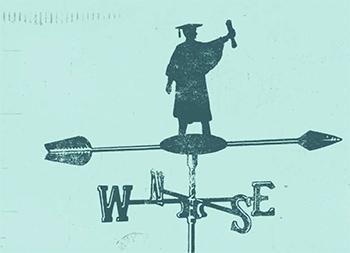Liberal Direction

A recent study shows that some forms of education really are better than others
by Michelle Simmons
After the glow of Commencement or the latest class reunion has worn off, how happy are alumni with their college? Do they continue to find value in their educational experience? Do they really have an edge in a competitive global economy?
According to a recent study, the answer is a definitive yes, especially among alumni of private, residential colleges like Dickinson.
The study, titled "The Value and Impact of the College Experience," was based on interviews conducted in 2002 and 2011 with 2,700 alumni of top-tier private and public institutions and found overwhelming evidence that the return on investment in a liberal-arts education continues to grow long after the mortarboards and gowns are put away.
The Annapolis Group, a consortium of 130 liberal-arts colleges and universities (of which Dickinson is a member), the study was conducted by higher-education consulting firm Hardwick Day. In the report's executive summary, the authors note that it "address[es] three of the big questions in the current discussion about higher education: Is it worth the cost? Does residential learning matter now that the Internet seems to be making online courses and for-profit education viable models for college learning? And, with the economy a mess, does a college degree really make a difference in the job hunt?"
Among its findings was some heartening news: 77 percent of liberal-arts graduates rated their overall undergraduate experience as "excellent," compared with 56 percent from the top 50 public universities. Moreover, 79 percent reported benefiting "very much" from the high-quality, teaching-oriented model they experienced, versus 39 percent at top public universities. Small class sizes, personalized attention, undergraduate student-faculty research opportunities and service-learning participation all factored highly in alumni reports of satisfaction.
Two seemingly subjective characteristics—engagement and satisfaction—turned out to be highly important measures. Again, according to the authors, students who experienced higher engagement reported better learning and life outcomes than those who did not experience high levels of engagement, regardless of the institution they attended. The analysis also documented that private, residential liberal-arts colleges do a much better job of fully engaging students—academically and socially.
The report goes on to note, "on measure after measure—from the quality of the learning experience to the nature of their engagement with faculty and peers, from the impact on intellectual and personal development to the value to their careers—alumni of private liberal-arts colleges, where the residential experience is a core dimension, say that they benefited dramatically personally and professionally, academically and socially from their college experience. They report this in far greater numbers and percentages than do alumni of large state universities, including the top public universities."
"Clearly this is more evidence of the value of a liberal-arts education," says President William G. Durden '71. "The careful attention we bring to a student and the focus on individual intellectual and social development by faculty, staff and other students make a difference. This study contributes to that case."
Dickinson's own recent survey of the class of 2006, conducted by the Office of Institutional Research, showed that within five years after graduation, 94 percent of alumni were working full time, in a graduate or professional school program or were accepted to attend such a program in fall 2011. Eighty-two percent of those working full time reported that they were either satisfied or very satisfied with their current job.
Among those alumni is Jason Gong '06, manager of global diversity and inclusion at American Express. "Dickinson challenged me to step outside of my comfort zone and beyond the boundaries I had set for myself," he says of the intangible—but now quantifiable—benefits of his Dickinson experience. "I developed the confidence to take risks and learned to trust my instincts—these are lessons that have yielded tremendous rewards in my professional and personal life."
Isn't that what every college graduate deserves?
Published October 1, 2012